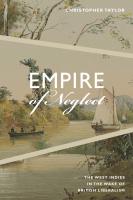
Synopsis
My research and teaching focus on the hemispheric Americas in the nineteenth century. While the British West Indies is my primary area of focus, I am interested in how these islands were linked to worlds beyond the boundaries of the British Empire. Working at the edges of economic history, political theory, and literary studies, I study how West Indian creoles drew on the ideas and texts that circulated through these entangled worlds to develop norms and model polities opposed to slavery, economic liberalism, and expansionist imperialism.
Biography
My current book project, Empire of Neglect: Imagining the Americas in a Liberal Age, explores how British West Indians responded to the discursive and institutional rise of liberal political economy within the British Empire. Arguing that economic liberalism brought creole notions of imperial citizenship to crisis—a crisis that they glossed as “neglect”—I show how West Indian authors drew on hemispheric resources to imagine anti-liberal modalities of political community. Focusing on the redeployment of texts (such as Uncle Tom’s Cabin), the investment in figures of sovereignty (such as Simón Bolívar), or the fanciful recollection of features of historical states (such as Spanish imperial jurisprudence), I argue that creoles sought cultural citizenship in the Americas as a compensation for the imperial citizenship they felt themselves to have lost.
I am beginning research for two subsequent projects. The first is tentatively titled I’m a Slave for You: Atlantic Modernity’s Impossible Subject. It explores Atlantic modernity’s emergence as premised on making it unthinkable—in political, legal, and cultural terms—for a human being to enslave him- or herself. How might we re-read the history of the forced enslavement of racialized others, on one hand, and consolidations of liberal norms of volitional agency and self-possession, on the other, in the horizon of this impossible, auto-enslaving subject? And how might thinking with this figure rejuvenate increasingly thin conceptions of freedom?
The second is tentatively titled Theory in the Age of the Less-Lethal. In it, I read several theoretical discourses elaborated through the early millennium—on precarity and vulnerability, on biopolitics and biopower—as both symptomatic of and functional for putatively democratic states’ absorption of spaces of critical publicness. I am interested in how the dismantling of such spaces has reduced political expressivity not simply to bodily performance, but to a restricted repertoire of gesture whose semantic power reattaches subjects to state power. I argue that a truly critical theory can only emerge through engagement with and supplementation from contemporary social movements: Arab Spring, Occupy, global antifascist organizing, the new anarchisms, and so on. How might we think of social movements as social scientists, of collective political actors as collective epistemic actors who generate forms of knowledge we need to know?
Select Publications
Book
- Empire of Neglect: Imagining the Americas in a Liberal Age (Duke University Press, forthcoming 2018)
Articles and Book Chapters
- "Sometimes You Just Fail: Protest and the Policing of Bad Feeling" in The Failed Individual, eds. Katharina Motyl and Regina Schober (forthcoming)
- "Theory in the Age of the Less-Lethal," Criticism (under review)
- “‘This is what democracy looks like!’: Occupy and the Local Touch of the Political,” in Todd Comer and Nathan Crook, eds.,From Wall Street to Main Street: The Regional Politics of Occupying (Cambridge, UK: Cambridge Scholars Publishing), forthcoming
- “The Refusal of Work: From the Postemancipation Caribbean to Post-Fordist Empire,” Small Axe, 44 (2014): 1-17
- “‘Most Holy Virgin Assist Me’: Subaltern Transnationalism and Positively Possible Worlds,” History of the Present, 4.1 (Spring 2014): 75-96
- “Sharing Time: C.L.R. James and Southern Agrarian Movements,” Social Text 111 (Spring 2012): 75-98
- “The Limbs of Empire: Ahab, Santa Anna, and Moby-Dick,” American Literature 83.1 (2011): 29-57
Outline Writing
- "The Black Jacobins: From Great Book to Classic?" Age of Revolutions (2016)
- “The Economist Magazine has had a ‘Slavery Problem’ since 1843,” Africa is a Country (2014)
- “Plantation Neoliberalism,” The New Inquiry (2014)
- “Romancing the Archive,” The New Inquiry (2014)
- “Liberalism’s Slavery and the Geography of Freedom,” AntipodeFoundation.org
- “The Ardor of Secession,” The New Inquiry (2012)
Reviews
- Review of Christian Høgsbjerg, C.L.R. James in Imperial Britain. Historical Materialism, forthcoming
- Review of Neil Lazarus, The Postcolonial Unconscious. Modern Philology, forthcoming
- Review of Ayşe Çelikkol’s Romances of Free Trade: British Literature, Laissez-Faire, and the Global Nineteenth Century. Modern Philology 111.3 (February 2014): E364-368
- Review of Gayatri Chakravorty Spivak’s Nationalism and the Imagination. Comparative Studies of South Asia, Africa, and the Middle East 31.3 (2011): 662-664

